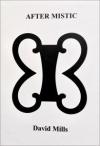During his Hearst Foundations Fellowship in 2019, David researched slavery in antebellum New England—focusing on Massachusetts and on New York City, where the country’s oldest and largest slave cemetery is located. In the video above, he discusses his writing career and how the American Antiquarian Society introduced a more focused archival aspect to his writing.
His chapbook, After Mistic (2020, New Feral Press), contains poems about Phillis Wheatly, William Lloyd Garrison, Cotton Mather, the first legally-manumitted, enslaved Africans; Massachusetts’ first enslaved individuals—Pequot Indians; the intersection of the state’s exploited, working-class, white, female labor and enslaved, southern, Negro labor, both in the service of cotton (a crop that once constituted half of America’s GDP); sonnets about Isaac Royall Jr. who funded Harvard’s first law professorship with money from his slave plantations and another sonnet in conversation with Massachusetts abolitionist John Greenleaf Whittier’s poem “Branded Hand.” Broadly, After Mistic, meditates on Massachusetts’ antipodal relationship to slavery: the state with the strongest abolitionist movement but also with the nation’s most cotton mills and rum distilleries—industries that hugely profited from the raw products of slave labor.
David previously received grants from the New York Foundation for the Arts and Breadloaf. He also wrote the audio script for the Macarthur-Genius-award-winner Deborah Willis’ national museum tour and exhibition “Reflections in Black: 100 Years of Black Photography”, which was exhibited at the Whitney, Dallas, and Getty West Museums. He also worked on a play commissioned and produced by the Juilliard School of Drama and recorded two poems for ESPN."
